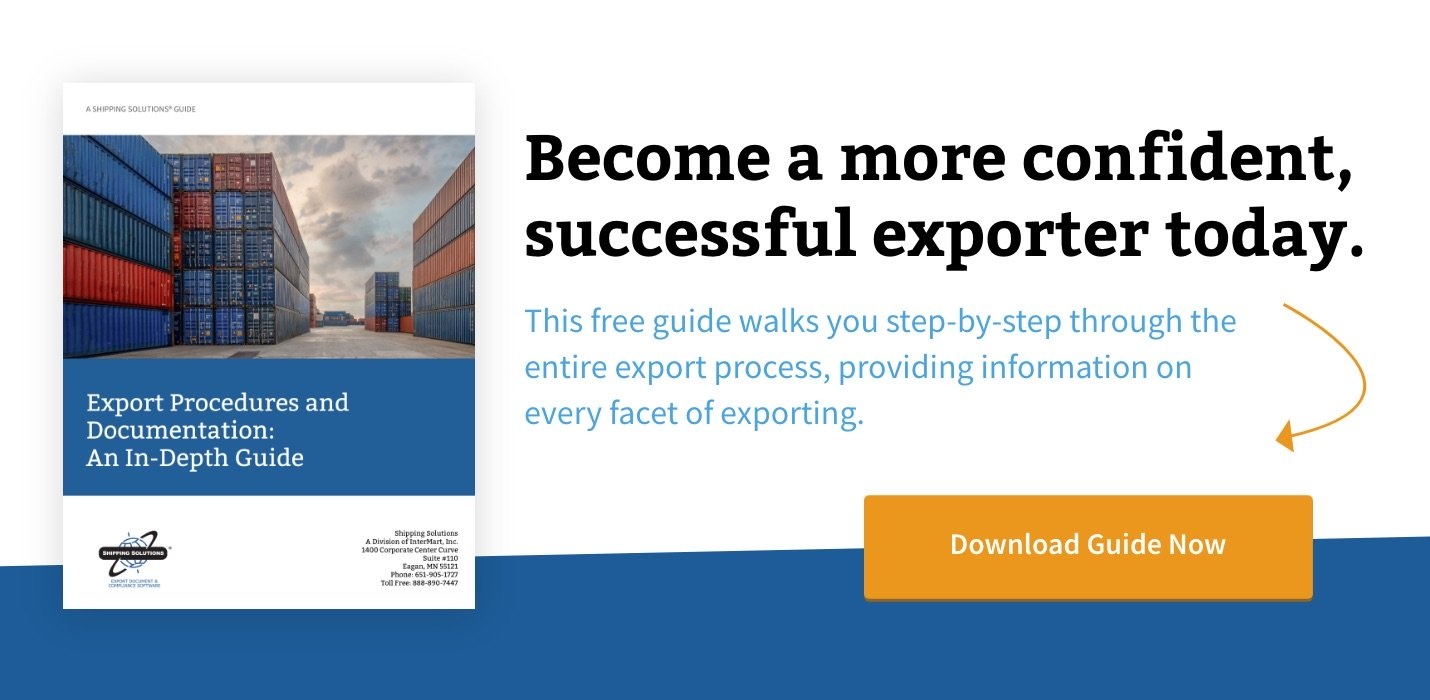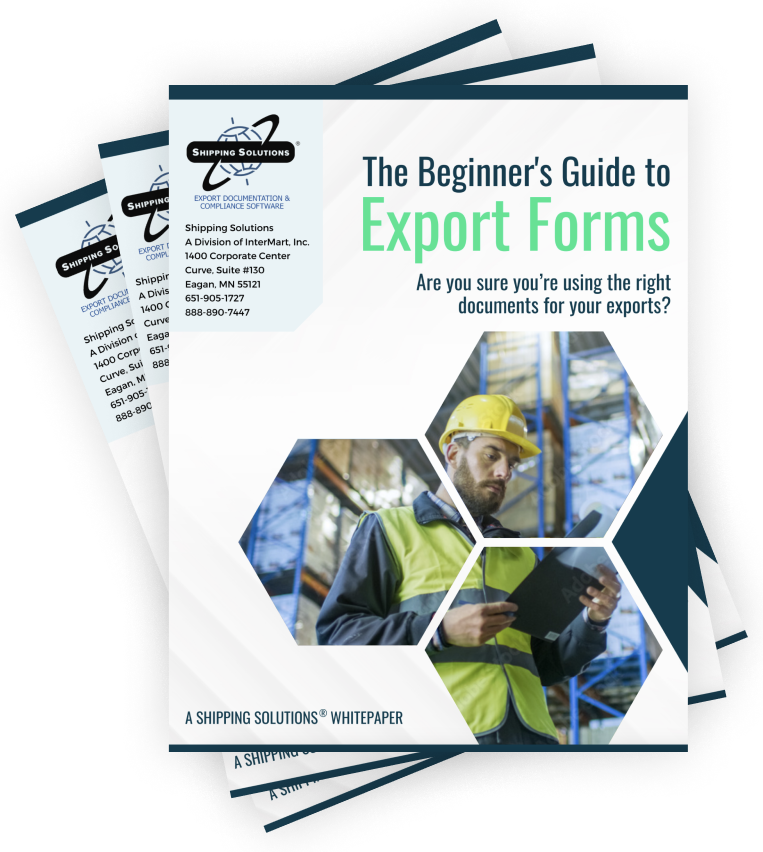The International Trade Blog International Sales & Marketing
How to Become an Exporter: 20+ Resources You Should Know
On: June 12, 2019 | By:  David Noah |
9 min. read
David Noah |
9 min. read
.jpg?width=375&name=How%20to%20Become%20an%20Exporter%20-%2020+%20Resources%20(Part%201).jpg) So, you want to know how to become an exporter. Congratulations on choosing to embark on this journey!
So, you want to know how to become an exporter. Congratulations on choosing to embark on this journey!
Now, take a deep breath: There’s a lot you need to know in order to become successful in the world of international trade. This article will help you get started.
Below are the best-of-the-best resources, sorted by the various stages of the export journey, from the initial product and market research phase to getting paid for your goods on time when a sale is complete. You can jump to each section using these quick links:
1. Identify Products to Export
2. Assess the Risks of Exporting
4. Get Acquainted with the Major Players
How to Become an Exporter
Exporting is a journey, but not one you'd ever want to take alone. That's why we've identified more than 20 different resources you can utilize as you guide your company through the entire process.
1. Identify Products to Export
The first thing you need to do to become an exporter is identify if there is a market(s) for the item(s) you wish to export. Utilize the following resources to do research and find out if there is a need:
U.S. Census Bureau Business Builder
This excellent tool from the Census Bureau can help you conduct market research by providing consumer spending data, which is information about how potential customers spend their money. This is just the tip of the iceberg. Check out the entire Census Bureau website to learn more.
U.S. State Department’s Country Guides
Scroll through your potential markets and check out the fact sheets to see economic and trade information as well as general facts about each area.
U.S. Commercial Service Offices
The Commercial Service offers exporters a full range of expertise in international trade, from finding and assessing markets to getting customized market research. You can find assistance locally in more than 100 U.S. Commercial Service offices nationwide or get in touch with one of the more than 70 international offices.
The Commercial Service offers its Gold Key Service, which is one of the best but most under-utilized services available to U.S. exporters. For a very reasonable fee, the Commercial Service will identify, vet and arrange meetings with potential partners in overseas markets where you have interest.
Learn more about how you can take advantage of this service in our article, Tapping into the U.S. Commercial Service's In-Country Offices.
Individual state trade offices can also help you identify your markets. Many states have established relationships with certain countries and have even opened branches of their trade offices to help local companies expand into those markets.
2. Assess the Risks of Exporting
Once you’ve identified the market opportunity for your products, you need to see if there are restrictions with regard to exporting to the country or countries you’ve identified and assess the risk of doing business there. These sites can help:
U.S. Commercial Service Offices
In addition to international company profiles, the Commercial Service can help you become aware of risks and legal considerations as you engage with new partners or overseas markets. In his series of articles about risk, Import-Export Due Diligence: Assessing Country and Customer Risk, Roberto Bergami identifies several tools exporters can use to evaluate risk.
Bureau of Industry and Security (BIS)
The U.S. Department of Commerce has jurisdiction over most goods exports from the United States. BIS is the agency within Commerce that is specifically charged with advancing U.S. national security, foreign policy, and economic interest through enforcement of the U.S. Export Administration Regulations (EAR).
Directorate of Defense Trade Controls (DDTC)
The DDTC enforces the U.S. International Traffic in Arms Regulations (ITAR) that controls the commercial exports of defense goods and services. If your exports fall under the jurisdiction of the DDTC, you must understand and comply with those regulations.
Chapter five of our Export Procedures and Documentation: An In-Depth Guide explains how to determine who has jurisdiction over your goods.
Shipping Solutions’ Trade Compliance Wizards
Before you export your goods to another country, you must determine whether or not you need an export license based on your product classification under ITAR's U.S. Munitions List (USML) or EAR's Commerce Control List (CCL), and the destination country. Our Export Controls Wizard does this for you—try it for free and see how much easier it can make your job! (For importers, you can also check to see if there are restrictions for importing goods in our Trade Wizards, too!)
3. Determine Market Entry
You’ve found a market, assessed that exporting to it is a reasonable risk, and now you’re ready to sell—but first, you should identify how you plan to do it. Will you sell directly, find a distributor, partner with someone in your partner country, or a combination of these?
These resources and articles can help you decide which options are most valuable for you:
U.S. Commercial Service Offices
Once again, local and global commercial service offices are hugely helpful in identifying how you are going to sell in to markets. They can help you find names of prospective partners in the countries you’ve identified and vet those people.
Additionally, the Commercial Service regularly holds global trade events, conferences, and trade missions across the world, bringing in people from foreign offices that you can meet with. The bonus? You don’t have to travel far to attend these conferences; there’s probably one close to where you do business!
Trade Information Center (TIC)
The specialists at the TIC provide export counseling for the Americas, Europe, the Middle East, Africa, and Asia. TIC international trade specialists can help exporters with questions about import tariffs, taxes, and customs procedures, especially for free trade agreements; commercial standards, regulations and practices and intellectual property rights; distribution channels, business travel, and other market information; opportunities and best prospects for U.S. companies in individual markets; and difficulties encountered on specific commercial transactions.
Small Business Administration Guide
The online version of this guide includes in-depth information on all aspects of planning, launching, managing, and growing your business.
This tool gives users access to current and cumulative U.S. export and import data. Exporters can utilize USA Trade Online to identify new markets, evaluate existing markets, and perform other market research tasks.
Many chambers of commerce seek to promote economic growth by assisting local businesses to expand into international markets. Local chambers present various seminars for businesses to assist with exporting their products. Some of these seminars are country specific while others are industry specific.
Other resources for gaining understanding of potential markets to sell into include TradeStats Express, The World Bank Atlas, and the CIA World Factbook.
4. Get Acquainted with the Major Players
Being an exporter is a big responsibility. You’ll want to get started on the right foot by getting acquainted with the major players in international trade. The quickest way to do this is right from your computer, simply by researching their websites.
Here are the top sites you need to know if you’re considering how to become an exporter:
The Bureau of Industry and Security
All exporters should know the ins-and-outs of BIS regulations. Chances are, your export activities will involve the BIS in some capacity, so get familiarized with how to comply with the regs now and avoid penalties and fines (or worse) from the start.
The BIS has educational seminars you can attend. I highly recommend their two-day seminar on complying with U.S. export controls for anyone serious about exporting.
Small Business Administration (SBA)
The SBA’s Small Business Development Centers (SBDC) provide counseling services for small businesses that want to export. They are an invaluable resource for anyone interested in learning how to become an exporter.
Service Corps of Retired Executives (SCORE)
SCORE is a resource partner of the U.S. Small Business Administration (SBA) that has helped more than 11 million entrepreneurs through mentoring, workshops and educational resources since 1964. Through SCORE, you may be able to find a mentor who has experience in export-related roles.
District Export Councils (DECs)
DECs assist in many of the workshops and seminars on exporting that are arranged by the U.S. Commercial Service offices, and they also sponsor their own. DEC members may also provide direct, personal counseling to less experienced exporters by suggesting marketing strategies, trade contacts, and ways to maximize success in overseas markets. You can obtain assistance from District Export Councils through the U.S. Commercial Service offices that they are affiliated with.
Banks
The international department at your local bank is an entity you should become familiar with as you begin your exporting journey.
Freight Forwarders
You will almost certainly work with a freight forwarder, and you should make sure you’ve engaged one who can provide assistance and help your business stay compliant. Check out 4 Steps for Ensuring a Good Relationship with Your Freight Forwarder.
Trade Associations
Depending on the industry you’re involved with, there may be an industry association that can offer guidance as you get started.
Join more than 32,000 other exporters and importers who get comprehensive information on all things export-related by subscribing to the Passages: The International Trade Blog. We cover everything from AES to export compliance to Free Trade Agreements to Incoterms—plus so much more.
In addition to the blog, we have published more than a dozen export-related white papers and other resources. And we have partnered with other organizations to present a variety of free webinars on all things export.
5. Get Export Training
There is training available for all levels of exporters—from those just getting started to successful, experienced professionals.
Government agencies like the U.S. Commercial Service, BIS, SBA, the Census Bureau, and more offer free and paid training in the form of webinars, seminars and more that can help you in any area of interest. Their websites offer details to these resources.
Private organizations like International Business Training (IBT) offer a variety of import-export seminars and webinars that will help you conduct your international business smarter, faster and more profitably.
Consultants can be an excellent resource for beginning exporters who want help. (In fact, we’re working on putting together a list of consultants. If that is what you do, we’d love to hear from you. Send me an email telling me about yourself and the services you provide for exporters.)

About the Author: David Noah
David Noah is the founder and president of Shipping Solutions, a software company that develops and sells export documentation and compliance software targeted at U.S. companies that export. David is a frequent speaker on export documentation and compliance issues and has published several articles on the topic.




